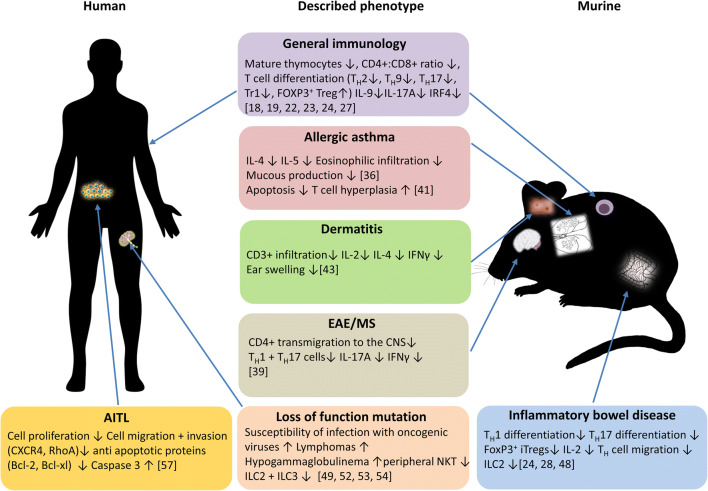Fig. 2.
Schematic comparison between the numerous phenotypes in murine and human immune systems caused by ITK deficiency. The loss of ITK has numerous effects on different malignancies in both mice and humans. In general, ITK deficiency results in less mature thymocytes in spleen and lymph nodes, defects in T cell differentiation and a decrease in IL-9, IL-17A and IRF4 expression. In the lung, the role of ITK is contradictory, as there are studies showing that ITK deficiency leads to less cell infiltration and less mucous production whereas other studies demonstrated that the loss has no beneficial effect and instead leading to T cell hyperplasia. Mice studies have shown that the loss of ITK results in a better outcome in experimental dermatitis models, with less T cell infiltration, cytokine secretion and ear swelling. In experimental mice models of multiple sclerosis, ITK deficiency leads to less CD4+ cell transmigration into the CNS as well as less IFNγ and IL-17A secretion. Also, in the gut, studies with experimental murine colitis models have shown that the loss of ITK leads to less Th1 and Th17 differentiation alongside with less expression of FoxP3 and IL-2. A loss of function mutation as described in humans leads to a higher susceptibility to viral infections with oncogenic viruses, development of lymphomas and hypogammaglobulinemia. On cellular basis, a decrease in peripheral NKT, ILC2 and ILC3 was detected. Lastly, in human T cell leukaemia and lymphoma cell lines, it was demonstrated that the loss of ITK leads to less cell proliferation, cell migration and cell invasion together with a higher expression of pro-apoptotic genes

